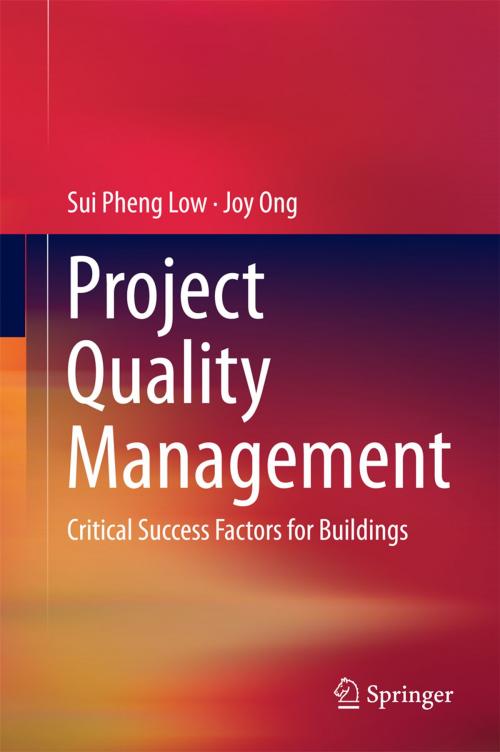Project Quality Management
Critical Success Factors for Buildings
Nonfiction, Science & Nature, Technology, Construction & Construction Trades, Business & Finance, Management & Leadership, Management| Author: | Sui Pheng Low, Joy Ong | ISBN: | 9789812870742 |
| Publisher: | Springer Singapore | Publication: | April 29, 2014 |
| Imprint: | Springer | Language: | English |
| Author: | Sui Pheng Low, Joy Ong |
| ISBN: | 9789812870742 |
| Publisher: | Springer Singapore |
| Publication: | April 29, 2014 |
| Imprint: | Springer |
| Language: | English |
The book presents the development of the Construction Quality Assessment System (CONQUAS), Singapore’s de facto quality performance measurement system, explains the application of the Quality Management System (QMS) to manage CONQUAS and identifies 33 critical success factors (CSFs) for achieving high CONQUAS scores. Through CONQUAS, the reader benefits from understanding how the Singapore government developed and implemented the first objective system for measuring what many building professionals have perceived to be elusive quality standards in the construction industry. The book presents both the theoretical concepts as well as the practical aspects to achieving strategic Project Quality Management that is anchored on the CSFs to building best practices. To realistically reflect the practical aspects and challenging issues faced by stakeholders in the construction industry, questionnaire surveys were conducted with building professionals to distinguish the importance level and extent of adoption of the 33 CSFs (identified from a comprehensive review of the extant literature) in influencing and affecting the achievement of high CONQUAS scores. These were further anchored by in-depth interviews with quality experts in the Singapore construction industry to provide a better understanding of issues relating to strategic Project Quality Management. Collectively, the empirical findings collated from the building professionals suggest that while the CSFs identified are known tenets of quality, these were still not being followed in their totality. A further case study was conducted through a formal set of in-depth interviews with the quality assurance team of a construction company who has direct involvement before, during and after their tremendous improvements in the CONQUAS scores attained. The strength of this book therefore represents a true account and reflections of real-life practices and experiences in the construction industry for contractors, quality managers and policy-makers to learn from. Although the context of this book relates to the Singapore experience, the lessons and recommendations are equally relevant and applicable to the global construction industry in both the developing and developed countries whose stakeholders (in both the public and private sectors) wish to understand how CONQUAS works, and how the CSFs identified can likewise be implemented for strategic Project Quality Management to building best practices. The book is therefore of interests to researchers, academia and practitioners in the construction industry as well as in other sectors of the economy (in Singapore and other countries) where learning points may be used for enhancing project quality management for buildings.
The book presents the development of the Construction Quality Assessment System (CONQUAS), Singapore’s de facto quality performance measurement system, explains the application of the Quality Management System (QMS) to manage CONQUAS and identifies 33 critical success factors (CSFs) for achieving high CONQUAS scores. Through CONQUAS, the reader benefits from understanding how the Singapore government developed and implemented the first objective system for measuring what many building professionals have perceived to be elusive quality standards in the construction industry. The book presents both the theoretical concepts as well as the practical aspects to achieving strategic Project Quality Management that is anchored on the CSFs to building best practices. To realistically reflect the practical aspects and challenging issues faced by stakeholders in the construction industry, questionnaire surveys were conducted with building professionals to distinguish the importance level and extent of adoption of the 33 CSFs (identified from a comprehensive review of the extant literature) in influencing and affecting the achievement of high CONQUAS scores. These were further anchored by in-depth interviews with quality experts in the Singapore construction industry to provide a better understanding of issues relating to strategic Project Quality Management. Collectively, the empirical findings collated from the building professionals suggest that while the CSFs identified are known tenets of quality, these were still not being followed in their totality. A further case study was conducted through a formal set of in-depth interviews with the quality assurance team of a construction company who has direct involvement before, during and after their tremendous improvements in the CONQUAS scores attained. The strength of this book therefore represents a true account and reflections of real-life practices and experiences in the construction industry for contractors, quality managers and policy-makers to learn from. Although the context of this book relates to the Singapore experience, the lessons and recommendations are equally relevant and applicable to the global construction industry in both the developing and developed countries whose stakeholders (in both the public and private sectors) wish to understand how CONQUAS works, and how the CSFs identified can likewise be implemented for strategic Project Quality Management to building best practices. The book is therefore of interests to researchers, academia and practitioners in the construction industry as well as in other sectors of the economy (in Singapore and other countries) where learning points may be used for enhancing project quality management for buildings.















